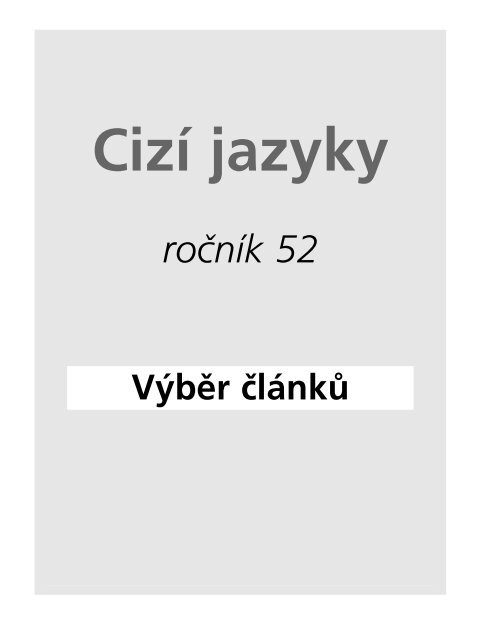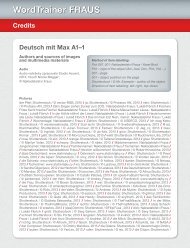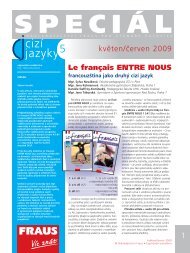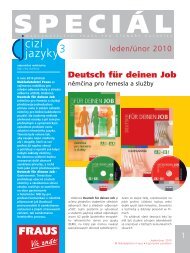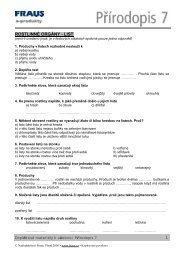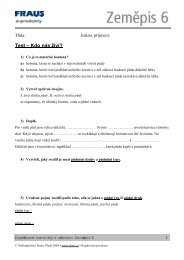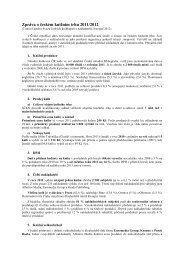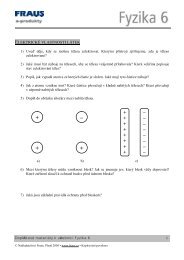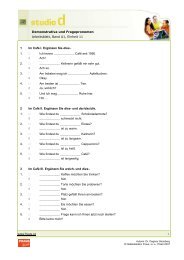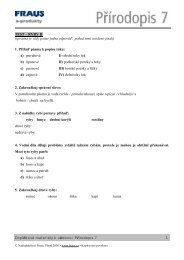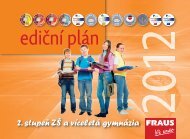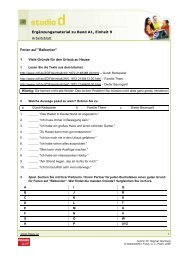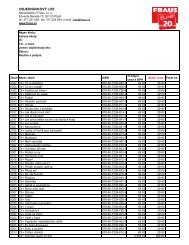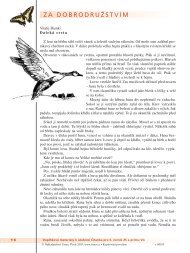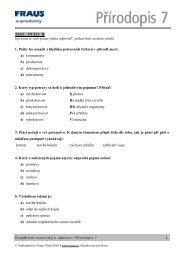Resumé všech článků v cizím jazyce - Fraus
Resumé všech článků v cizím jazyce - Fraus
Resumé všech článků v cizím jazyce - Fraus
You also want an ePaper? Increase the reach of your titles
YUMPU automatically turns print PDFs into web optimized ePapers that Google loves.
Cizí jazyky<br />
ročník 52<br />
Výběr <strong>článků</strong>
č. 1<br />
Cizí jazyky r. 52<br />
RVP G a didaktické aspekty literární výchovy<br />
v rámci výuky cizího jazyka<br />
Radek V í t, Praha, Univerzita Karlova, Pedagogická fakulta<br />
SUMMARY<br />
Framework Educational Programme for Grammar Schools and Methodology Aspects of Literature of L2 as Part of Foreign<br />
Language Teaching<br />
This text deals with innovations brought about by the Framework Educational Programme for grammar schools in teaching literature of<br />
L2 in foreign language lessons. The focus is on the pupils’ gaining and developing key competences. Further areas that need to be researched<br />
are suggested.<br />
K otázce neologizmů v současné německé<br />
slovní zásobě (II)<br />
Zdroj neologického lexika, přejímky, iniciálové zkratky a emotikony<br />
Dalibor Zeman, Univerzita Karlova, Pedagogická fakulta, Praha<br />
ZUSAMMENFASSUNG<br />
Zur Frage der Neologismen in der deutschen Gegenwartssprachen<br />
Die wesentlichen Abgrenzungskriterien des Neologismus von anderen lexikalischen Neuheiten wie z. B. von Okkasionalismen sind<br />
Usualisierung, Lexikalisierung und Integration. Es ist grundsätzlich davon auszugehen, dass die deutsche Sprache kein homogenes System<br />
ist, sondern sie befindet sich ständig im Wandel, und dazu gehört auch die Entstehung neuer Wörter. Sehr oft kommt es zur Neologie einfach<br />
dadurch, dass die Sprache mit der Realität Schritt halten muss. Man denke nur an die gesellschaftlichen Ereignisse der 1990er Jahre<br />
bzw. die neuen technischen Errungenschaften im Computerzeitalter.<br />
In diesem Beitrag werden die wichtigsten Arten von Neologismen besprochen, und zwar: 1. Übernahmen von Wortgut anderer Sprachen<br />
(insb. Anglizismen); hier sind sowohl der Ausdruck als auch die Bedeutung neu; 2. Neubedeutungen: hier ist nur die Bedeutung neu, einem<br />
bestehenden Ausdruck wird nur eine neue Bedeutung zugeschrieben; 3. Emoticons. Von einem neuen Wort kann man – aus linguistischer<br />
Sicht – allerdings erst dann sprechen, wenn der Prozess der Lexikalisierung abgeschlossen ist.<br />
Faux amis medzi francúzskymi ekvivalentmi<br />
slovenských názvov profesií na -lóg<br />
Elena B a r a n o v á, Fakulta humanitných vied, Univerzita Mateja Bela, Banská Bystrica<br />
RÉSUMÉ<br />
Faux amis parmi les équivalents français des noms slovaques de professions terminés en -lóg<br />
Le présent article porte sur les équivalents français des substantifs animés (noms de spécialistes ou de chercheurs) terminés en slovaque<br />
par le suffixe -lóg. Après une analyse des équivalents français de 40 noms slovaques dans 9 dictionnaires unilingues et 5 dictionnaires bilingues,<br />
il convient de classer ces substantifs dans la catégorie des faux-amis, car, dans la plupart des cas, ils réservent un ou plusieurs<br />
„pièges“ aux utilisateurs non-avertis.
Max Brod (1884–1968)<br />
Leoš Houska, Praha<br />
ZUSAMMENFASSUNG<br />
Max Brod (1884–1968)<br />
Max Brod wird als wichtiger Vertreter der Prager deutschen Literatur und als Freund Franz Kafkas charakterisiert, dessen literarischen<br />
Nachlass er rettete und herausgegeben hatte. U.a. verdiente er sich auch um die Durchsetzung der Werke von Leoš Janáček in Deutschland.<br />
Nicht unerwähnt bleibt sein eigenes aufgrund der tschechisch-deutschen Symbiose basierendes literarisches Schaffen, darunter seine Memoiren<br />
Streitbares Leben und Der Prager Kreis.<br />
Čtyři sta let od založení Québeku<br />
Jan Holeš – Jaromír Kadlec, FF UP Olomouc<br />
SUMMARY<br />
Four Centuries since the Foundation of Québec<br />
The article reminds the celebration of four centuries of French heritage in Quebec. It resumes the milestones of its history, from the foundation<br />
of a fur-trading post on the St. Lawrence River by Samuel de Champlain in 1608, till the “quiet revolution” of the 1960. A series<br />
of exhibits, festivals and performances will be held under this occasion.<br />
Státní symboly Lichtenštejnska<br />
Karel Vratišovský, Friedrich-Alexander-Universität, Nürnberg/Erlangen<br />
SUMMARY<br />
National symbols of Liechtenstein<br />
This Article deals with national symbols of Liechtenstein – it aims at the big and small national symbol, which is identical with the coatof<br />
-arms of the Liechtenstein’s prince. The article focuses at the historical development of the national symbol in connection with the<br />
Czech Republic. The article also mentions the national flag and anthem.<br />
Průzkum výuky cizích jazyků v pražských<br />
mateřských školách<br />
Zuzana Križková, Jazyková škola The Bell School, Praha<br />
Daniela C a p c a r o v á, Donath-Burson-Marsteller, Praha<br />
SUMMARY<br />
Investigation of FLT at Prague kindergartens<br />
The Bell School survey research carried out among the kindergartens in Prague in May this year shows that English is definitely the first<br />
language for children of pre-school age. English is primarily requested by the parents and lectures take place mostly 1-2 times a week in<br />
groups of 6-10 children. This language is taught by Czech teachers mostly coming from language schools. The most frequent teaching<br />
method is a game. Development of thinking, enhancement of communication skills and new experiences for children were the main positive<br />
effects of English classes declared by kindergarten principals.
Práce s videem při výuce cizího jazyka na VŠ<br />
Jitka Hloušková, Univerzita Pardubice, Jazykové centrum<br />
SUMMARY<br />
Using Video in LSP Teaching at University<br />
The article deals with some ideas for using video in teaching Languages for Specific Purposes at university courses. It concentrates on<br />
authentic films or TV programmes, leaving aside instructional recordings. It was inspired by making use of some episodes of the British<br />
television series The IT Crowd in classes. It gives examples of activities that can be used before, during or after watching.<br />
Jsou vstupní jazykové znalosti studentů na VŠ<br />
dostatečné pro studium odborného<br />
či profesního jazyka?<br />
Markéta Flajšhansová, Janka Kalousová, Jana Hofmannová,<br />
Jazykové centrum Jihočeské univerzity<br />
SUMMARY<br />
Are the entrance language skills of university students sufficient for learning the technical or professional language?<br />
An inquiry about the initial level of knowledge and skills in German language of the first year students of faculties of Agriculture,<br />
Economics, and Health and Social Studies in A1–B2 levels according to the Common European Framework of Reference (CEFR) was<br />
performed by the Language Centre of University of South Bohemia in České Budějovice in the academic year 2007/2008. Only 38.28 %<br />
of respondents gained the requested B1 and B2 levels and were prepared for learning the professional language at the university.<br />
K 10. výročí česko-německého vzdělávacího<br />
projektu v Pirně (I)<br />
Pokračování v č.2.<br />
Miroslav Bartošek, český školní koordinátor na FSG v Pirně<br />
Dagmar Švermová, MŠMT ČR, Praha<br />
Codex Argenteus: Rodinné stříbro<br />
gótského písemnictví<br />
Miroslav Černý, Ostravská univerzita, Filozofická fakulta, Ostrava<br />
SUMMARY<br />
The most valuable asset of the Gothic language<br />
The present article is an introductory presentation of Codex Argenteus. The manuscript, so called “Silver Bible”, is a copy of Wulfila’s<br />
gothic translation of scripture, prepared for Theodoric the Great in Ravenna in the early 6 th century. Today it is kept in Uppsala University<br />
Library. In addition to its philological interest, especially within the field of Germanic studies, its main attraction seems to be interrelated<br />
with its wanderings, and the hidden parts of its history.
č. 2<br />
Cizí jazyky r. 52<br />
Six Vocabulary Activities<br />
for the English Language Classroom (I)<br />
Keith S. F olse, University of Central Florida, United States<br />
RESUMÉ<br />
Autor článku v úvode podčiarkuje dôležité postavenie slovnej zásoby pre úspešnú komunikáciu. Práca so slovnou zásobou je súčasťou<br />
vyučovania anglického jazyka, ale nie vždy môžeme byť s výsledkom tohto osvojovania spokojní. Autor upriamuje čitateľovu pozornosť<br />
na päť typov slov, ktoré sú pre úspešnú komunikáciu v angličtine dôležité.<br />
Vychádza z charakteristiky jednoduchých slov, pričom upozorňuje na to, že na bežnú každodennú komunikáciu vystačí účastník komunikácie<br />
s 2 000 slovami, ale na to, aby bol schopný úspešne čítať/počúvať autentický text potrebuje 3 000 slov. Učiaci sa, ktorí predpokladajú<br />
využívať cudzí jazyk na akademické účely už však potrebujú ovládať 10 000 slov. Autor zároveň upozorňuje, že nevystačíme len<br />
s individuálnymi slovami, pretože pre angličtinu sú charakteristické ustálené slovné spojenia, frázové slovesá a idiomatické spojenia.<br />
Upozorňuje na fakt, že osvojovanie slovnej zásoby sa nezaobíde bez pochopenia polysémie, pochopenia úlohy konotácií a kolokácií, ako<br />
aj to, že každé slovo vo vete má aj svoju gramatickú funkciu.<br />
Túto teoretickú časť uzatvára autor dôrazom na tri ciele, ktoré považuje za kľúčové pre úspešné osvojenie slovnej zásoby: sústrediť sa na<br />
slovnú zásobu, uvedomiť si, že porozumenie polysémie slov je úzko späté s porozumením úlohy kontextu a rozvíjať úspešné stratégie<br />
osvojovania slovnej zásoby.<br />
Převzato z časopisu English Teaching Forum, 2008, č. 3.<br />
Lexikální úskalí německého jazyka<br />
Věra Höppnerová, VŠE, Praha<br />
SUMMARY<br />
The asymmetry in the Czech and German vocabulary is one of the greatest difficulties for the language acquisition. It leads to the wrong<br />
choice of words which results in misunderstanding. These errors are commited by<br />
1. interlingual interference – the disturbing influence of the mother tongue<br />
2. paronymy – exchanging of words in the foreign language owing to their semantic or fonetic similarity in both languages<br />
3. „false friends“ – foreign words in the foreign language which are presumed to have the same meaning and form as in the mother language.<br />
Literatura pro 21. století<br />
(Kanadská frankofonní literatura pro děti a mládež)<br />
Květa K unešová, Univerzita Hradec Králové, Pedagogická fakulta<br />
SUMMARY<br />
The 400th anniversary of the foundation of Quebec City is an opportunity to remember the historical and cultural frame of children’s and<br />
youth literature in Francophone Canada. Since 1971, this literary area has been developping with much intensity and enthusiasm, being<br />
supported by authors, libraries, publishers, magazines and government structures.
Státní symboly Lucemburska<br />
Karel Vratišovský, Universität Wien<br />
SUMMARY<br />
This article discusses the national symbols of the second smallest country in the EU, Grand Duchy of Luxembourg. The Author deals with<br />
the current three forms of the national emblem (small, medium and great national emblem); he also mentions their history and its changes<br />
from the early beginning of the Luxembourg shire, throughout its promotion by emperor Charles IV, to grand duchy established in 1815.<br />
National flag is also mentioned, and its resemblance with Netherlands' national flag is discussed.<br />
K 10. výročí česko-německého vzdělávacího<br />
projektu v Pirně (II)<br />
Miroslav Bartošek, český školní koordinátor na FSG v Pirně<br />
Dagmar Švermová, MŠMT ČR, Praha<br />
ZUSAMMENFASSUNG<br />
Zum 10. Jahrestag des tschechisch-deutschen Ausbildungsprojekts in Pirna<br />
Die beiden Minister für schulische Bildung setzten vor 10 Jahren ihre Unterschrift unter eine Vereinbarung, die den Beginn des binationalen<br />
Bildungsweges in Pirna besiegelt. Der Gedanke, die jungen Menschen aus der Euro-Region Elbe-Labe für die Geschichte, Kultur<br />
und Lebensweise des Partnerlandes zu sensibilisieren, hat im binationalen-bilingualen tschechisch-deutschen Bildungsgang im Sinne einer<br />
„Brückenfunktion“ die praktische Umsetzung gefunden. Das Projekt, das einen bedeutsamen Schritt in Richtung auf ein vereintes<br />
Europa, zur europäischen Einigung, darstellt, hat in diesem Jahr 10-jähriges Jubiläum gefeiert. Die – auch durch eine externe<br />
Untersuchung der TU Dresden nachgewiesene hohe Qualität der gemeinsamen Ausbildung wird durch die Auszeichnung der Schule mit<br />
dem „Europäischen Sprachensiegel“ im Jahr 2005 noch unterstrichen. Im Jahr 2000 überzeugte sich der damalige Bundeskanzler vom<br />
Wert einer solchen Ausbildung; 2006 informierten sich Herr Bundespräsident Köhler und der Ministerpräsident der Tschechischen<br />
Republik, Herr Václav Klaus, über das binationale Vorhaben.<br />
Hádej, jak se jmenuji<br />
Zdeňka S c hejbalová, Masarykova univerzita v Brně, Pedagogická fakulta<br />
SUMMARY<br />
Guess my name<br />
The activity is determined to acquire the orthografy of French. The teacher uses some indication for a proper or local noun that the pupils<br />
can know and they guess its name. On the name, the teacher demonstrates patterns of the french orthografy. The orthografy of the known<br />
proper or local noun is more simple for comprehension and serves as a model for the orthography and the pronounciation of a new word.
č. 3<br />
Cizí jazyky r. 52<br />
Six Vocabulary Activities<br />
for the English Language Classroom (II)<br />
Keith S. F olse, University of Central Florida, United States<br />
RESUMÉ<br />
V druhej časti článku sa autor venuje spájaniu teórie a praxe osvojovania slovnej zásoby. Ponúka učiteľom šesť aktivít na pomoc učiacim<br />
sa. Odporúča učiteľom, aby dbali u žiakov na to, aby si zapisovali slová a slovné spojenia do slovníčkov. No zároveň upozorňuje na to, že<br />
ani postery so zoznamom, povedzme kľúčových slov, ktorý sa sústavne doplňuje, nie je na zahodenie. Je to dobrá pomôcka pre zapamätanie<br />
slov a slovných spojení. Autor ponúka aj kartičky s cvičeniami, do ktorých sa dopĺňajú slová, čím sa prirodzene tvorí kontext pre<br />
dané slovo.<br />
Inou aktivitou je aj usporadúvanie slov podľa nejakých osobitných znakov, napríklad zaradenie názvov miest podľa počtu obyvateľov alebo<br />
historických udalostí. Zapamätanie a opakovanie slov uľahčí „aukcia viet so slovami“, pri ktorej žiaci „nakupujú“ správne vety.<br />
Autor v závere podčiarkuje fakt, že učitelia majú klásť dôraz na osvojovanie slovnej zásoby, ale ono sa nemá diať pod stresom. Uvoľnená<br />
atmosféra je aj v tomto prípade základom úspechu.<br />
Převzato z časopisu English Teaching Forum, 2008, 3.<br />
Funkce vedlejších vět podmětných v německém<br />
trestním zákoníku<br />
Marina Mináriková, Fakulta filozofická Západočeské univerzity v Plzni<br />
SUMMARY<br />
This article deals with the function of the subject clause in the chosen legal text – The German Criminal Code. The subject clause plays<br />
a significant role there in expressing the facts of the crime – a substantial part of the criminal regulation. They state what constitutes unlawful<br />
conduct which is punishable by a criminal sanction. The author explains the specific characteristics of the subject clause used in<br />
this context and furthermore, she explains, why the above-mentioned syntactic form is frequently used to express the facts of the crime,<br />
i.e. what syntactic and semantic advantages it offers. For comparison, the author provides a list of other syntactic structures used to express<br />
the same content. In her analysis, the author takes into account the usage of similar texts in the university education of students who<br />
may encounter similar texts in their subsequent professional careers, e.g. Germanists or lawyers.<br />
Mark Twain o vyučování a učení se jazykům<br />
Christopher K o y , Pedagogická fakulta Jihočeské univerzity v Českých Budějovicích<br />
SUMMARY<br />
This contribution highlights Mark Twain’s keen interest in foreign language learning and his struggle to acquire a number of languages.<br />
Offering his views on learning French, Italian and German, Mark Twain reveals his often entertaining perspective on the frustrating aspects<br />
of learning languages possessing different grammatical structures than English. Occasionally he offers innovative ideas about language<br />
acquisition which, in some cases, were ahead of his time.<br />
Státní symboly USA<br />
Karel Vratišovský, Universität Wien<br />
Anna K r onusová, Pedagogická fakulta Univerzity Karlovy v Praze<br />
SUMMARY<br />
This article deals with the national symbol of world power state, the United States of America. The authors describe the current state of<br />
the national flag of the United States, consisting of thirteen alternating red and white stripes and fifty white stars in a blue rectangular canton.<br />
They also describe the Great Seal of the United States, the front of the Seal. It is also dealt with the origin and historical progress of<br />
these emblems ever since 1776. Attention is also paid to emblems of the Confederate States of America which established during the Civil<br />
war throughout 1860 till 1865.
č. 4<br />
Cizí jazyky r. 52<br />
Učení se <strong>cizím</strong> jazykům a řešení úloh<br />
řečového typu<br />
Věra J a n í k o v á , Pedagogická fakulta Masarykovy univerzity v Brně<br />
ZUSAMMENFASSUNG<br />
Fremdsprachenlernen und aufgabenorientierter Unterricht<br />
Im kommunikativen Fremdsprachenunterricht erscheinen in fremdsprachigen Klassen im höheren Maße Aufgaben, die hier die<br />
Kommunikation ermöglichen und gleichzetig versuchen, den natürlichen Spracherwerb mit einer sprachlichen Systematisierung und<br />
Strukturierung sinnvoll und effizient zu verbinden. Im Beitrag wird das Konzept des aufgabenorientertierten Fremdsprachenunterrichts<br />
vorgestellt.<br />
Cizí slova v němčině a v češtině<br />
z hlediska interference<br />
Věra Höppnerová, Vysoká škola ekonomická v Praze<br />
SUMMARY<br />
Foreign words in German and Czech from the point of view of interference<br />
Words of foreign origin have come into use with increasing international contact over time. On the one hand, they can make learning<br />
a foreign language easier, simplifying everday communication among people with different mother tongues. However, a comparison of<br />
foreign words in Czech and their apparent equivalents in German reveals numerous instance of different usage and meaning. This interference<br />
between languages can be a source of mistakes resulting in misunderstandings.<br />
Francouzské imparfait v českém<br />
učebním prostředí<br />
Hana Loucká, Filozofická fakulta Univerzity Karlovy v Praze<br />
RÉSUMÉ<br />
Imparfait français dans le milieu pédagogique tchèque<br />
Par cette analyse nous avons voulu contribuer à l’étude de l’opposition PC / Imparfait dans la perspective du public tchèque apprenant<br />
une langue typologiquement différente de sa langue maternelle. Nous avons essayé d’identifier l’origine des hésitations des apprenants<br />
tchèques devant le choix entre l’imparfait et le PC en soulignant le caractère de durée commun au passé des verbes imperfectifs tchèques<br />
et à l’imparfait des verbes français qui amène le public tchèque à utiliser l’imparfait non seulement pour exprimer une action /un état qui<br />
durait sans limite mais aussi, par erreur, pour exprimer une action /un état qui a duré un certain temps. L’imparfait comme le temps du<br />
contexte ne devrait pas être présenté isolément mais dans un texte plus large qu’un seul énoncé et par rapport à un événement exprimé<br />
par un verbe au PC (ou PS).<br />
Libuše Moníková – německy píšící<br />
autorka z Čech<br />
Renata Cornejo, Filozofická fakulta UJEP v Ústí nad Labem<br />
ZUSAMMENFASSUNG<br />
Libuše Moníková – eine deutsch schreibende Autorin aus Böhmen<br />
Im Beitrag wird das Werk von Libuše Moníková vorgestellt, einer der bedeutendsten deutsch schreibenden Autorinnen, die die damalige<br />
Tschechoslowakei 1971 aus politischen Gründen verlassen hat. In der BRD fing sie an auf Deutsch zu schreiben und konnte bald beachtenswerte<br />
Erfolge erzielen – 1987 wurde sie mit dem Alfred-Döblin-Preis für ihren Roman Die Fassade, 1989 mit dem Kafka-Preis, 1991
mit dem Adelbert von Chamisso-Preis ausgezeichnet. Ihr literarisches Werk, obwohl konsequent in deutscher Sprache geschrieben, bleibt<br />
stets thematisch in Böhmen bzw. in dessen Geschichte, Kultur und Literatur verankert, die verlorene Heimat wird von Moníková literarisch<br />
immer wieder (de)konstruiert, entmythologisiert und neu imaginiert. Trotz dieser Tatsache blieb sie zu Lebzeiten dem tschechischen<br />
Publikum eher unbekannt, was sich allmählich zu ändern scheint.<br />
Setkání se španělským prozaikem<br />
José María Merinem<br />
Helena Z b udilová, Filozofická fakulta Jihočeské univerzity v Českých Budějovicích<br />
RESUMEN<br />
Encuentro con el prosaico espagñol José María Merino<br />
El narrador José María Merino es considerado uno de los autores españoles contemporáneos que de manera más decisiva ha contribuido<br />
a convertir el cuento corto en género mayor. Sus obras son valoradas positivamente no sólo por los lectores, sino también los críticos literarios,<br />
hecho demostrado por los premios de la crítica especializada obtenidos por el autor. Los rasgos característicos de su narrativa se<br />
basan sobre todo en el dominio del fenómeno de la narración; el autor se convierte así en “narrador de lo fantástico”.<br />
Státní symboly Dánského království<br />
Karel Vratišovský, Universität Wien<br />
Anna K r onusová, Pedagogická fakulta Univerzity Karlovy v Praze<br />
SUMMARY<br />
This article deals with the current state and historical development of Coats of Arms of Danish Kingdom. The authors describe not only<br />
the National Coat of Arms but also the Royal Coat of Arms, which are used only by the members of royal family or royal institutions. The<br />
authors also mention the red national flag with the typical white Scandinavian cross.<br />
Akronyma v angličtině<br />
Ivana Hedvábná, Vysoká škola ekonomická v Praze<br />
SUMMARY<br />
Acronyms in English<br />
This article discusses the current tendency of using acronyms in English as a result of concise and fast communication in the rapidly developing<br />
world. Acronyms are defined in contrast to initialisms and the important types of acronyms are presented (e.g. backronyms,<br />
pseudo-acronyms, recursive acronyms, redundant acronyms). The reasons why acronyms have come into being and why they are used are<br />
explained. In conclusion the question is raised whether the excessive use of acronyms does not distort the standard English language.<br />
Odraz niektorých farieb v nemeckých frazémach<br />
Miriam Olejárová, Ekonomická fakulta Univerzity Mateja Bela, Banská Bystrica<br />
ZUSAMMENFASSUNG<br />
Widerspiegelung einiger Farben in den deutschen Phrasemen<br />
Die Symbolik spielt im Menschenleben eine bedeutende Rolle. Sprachsymbole können Tiere und Pflanzen, Naturphänomene, Zahlen oder<br />
Farben usw. sein. Riten und Gebräuche werden oft von bestimmten Farben begleitet. Sie haben in verschiedenen Kulturen unterschiedliche<br />
Bedeutungen. Uns interessierten die Fragen, wie die Farben interpretiert werden und welche Funktion sie in den deutschen phraseologischen<br />
Wendungen übernommen haben. Aus der ganzen Farbenpalette werden die Phraseme mit den Komponenten grau, rot, schwarz<br />
und weiß gewählt, weil sie sowohl in den Phrasemen der Allgemeinsprache, als auch der Wirtschaftssprache vorkommen. Die deutschen<br />
Phraseme mit Farbkomponenten werden der Fachzeitschrift „Wirtschaftswoche“ im Zeitraum 2007–2008 entnommen.
č. 5<br />
Cizí jazyky r. 52<br />
Globální témata ve výuce cizích jazyků<br />
(a zejména angličtiny)<br />
Zuzana Hlavičková, Praha<br />
SUMMARY<br />
Global issues in foreign language teaching (particularly in teaching English)<br />
In our globalized world it is of growing importance that schools and especially foreign language teachers raise awareness of global issues.<br />
Consequently, it is pivotal to give students opportunities to apply knowledge to up-to-date problems; build skills in communication and<br />
cooperation and conduct activities that enhance their ability to look at the world from different perspectives and foster respect for different<br />
values. Global education is an educational concept that develops communicative, personal and social competences through contentbased<br />
teaching and student-centred pedagogy, such as group work, simulations, role plays and other interactive methods.<br />
Problematika chyby v cizojazyčné výuce<br />
Šárka Klarová, Pedagogická fakulta UK v Praze<br />
SUMMARY<br />
Problems relating to errors and mistakes made in foreign language acquisition<br />
This paper explores various aspects of errors and mistakes made during the acquisition of a second language. These errors and mistakes<br />
are defined, classified, utilized in the learning process, and evaluated as to their main causes in oral and written speech. Furthermore, we<br />
seek to analyze, with regards to the assessment of writing and speaking, the most frequent criteria and common ways for correcting language;<br />
both spoken and written. Finally, this material focuses on the necessity of teaching students skills such as self-correction and selfassessment.<br />
Professeur, professeure alebo professeuse ?<br />
Elena B a r a n o v á, FHV UMB Banská Bystrica<br />
RÉSUMÉ<br />
Professeur, professeure ou professeuse ?<br />
L’article porte sur la situation actuelle des formes féminines du substantif le professeur : la professeur, la professeure, la professeuse, la professoresse.<br />
Il note leur présence dans des dictionnaires et grammaires sur papier et en ligne par rapport aux documents officiels s’y rapportant :<br />
Journal officiel (1986), Femme j’écris ton nom (1998), avis de l’Académie française (2002).<br />
Neterminologická súčasť odborného textu<br />
z hľadiska prekladu<br />
Alojz K e n í ž, Filozofická fakulta UK, Bratislava<br />
SUMMARY<br />
Non-terminological Part of Specialized Texts and its Translation<br />
The intention of this article is to suggest that not only the terminological production problems can occur in translating specialized texts.<br />
In this context is also very important the non-terminological component of the source versus target languages. That means increased<br />
attention must paid to non-terminological lexical semantics, phrazeology, and predominantly to the stylistic level of both texts.
Génius mnoha tváří<br />
(Nikolaj Vasiljevič Gogol, 1809–1852)<br />
Radka Hříbková, Pedagogická fakulta Univerzity Karlovy v Praze<br />
–≈«fiÃ≈<br />
ÃÌÓ„ÓcÚÓappleÓÌÌËÈ „ÂÌËÈ (Õ. ¬. √Ó„Óθ, 1809ñ1852)<br />
–ˇ‰ÓÏ Ò À. Õ. “ÓÎÒÚ˚Ï, ‘. Ã. ƒÓÒÚÓ‚ÒÍËÏ Ë ¿. œ. ◊ÂıÓ‚˚Ï Õ. ¬. √Ó„Óθ ÔappleË̇‰ÎÂÊ‡Î Í ÚÂÏ appleÛÒÒÍËÏ Í·ÒÒË͇Ï, Ú‚Óapple˜ÂÒÚ‚Ó<br />
ÍÓÚÓapple˚ı ̇˷ÓΠˇappleÍÓ ÓÚapple‡ÁËÎÓÒ¸ ‚ ˜Â¯ÒÍÓÈ ÍÛθÚÛapple XIX Ë XX ‚ÂÍÓ‚. ¬ÓÒÔappleˡÚË √Ó„ÓΡ ‚ ◊ÂıËË, Í‡Í Ë ‚ –ÓÒÒËË, ÒÛ˘-<br />
ÂÒÚ‚ÂÌÌÓ ÏÂÌˇÎÓÒ¸. “Ó„‰‡ Í‡Í ‚ XIX ‚ÂÍ ˜Â¯ÒÍË ÔËÒ‡ÚÂÎË ‚‰ÓıÌӂΡÎËÒ¸ ÔappleÂʉ ‚ÒÂ„Ó Ò‡ÚËapple˘ÂÒÍËÏ ËÁÓ·apple‡ÊÂÌËÂÏ Ìapple‡‚Ó‚<br />
Ë ı‡apple‡ÍÚÂappleÓ‚ Û √Ó„ÓΡ, Â„Ó ÔÓ‚ÂÒÚ‚Ó‚‡ÚÂθÌ˚ÏË ÔappleË∏χÏË Ë „ÛχÌËÁÏÓÏ, ‚ ÍÓ̈ XIX ‚Â͇ Ë ‚ XX ‚ÂÍ Ëı ÒÚ‡ÎÓ ÔappleË‚ÎÂ͇ڸ<br />
Ú‡ÍÊÂ Â„Ó Ï‡ÒÚÂappleÒÚ‚Ó „appleÓÚÂÒ͇ Ë ‡·ÒÛapple‰‡, ‰ÛıÓ‚Ì˚ ÒÚÓappleÓÌ˚ Â„Ó ‚ˉÂÌˡ ÏËapple‡ Ë ÒÔÓÒÓ·ÌÓÒÚ¸ „ÎÛ·ÓÍÓ ÔappleÓÌËÍÌÛÚ¸ ‚Ó ‚ÌÛÚappleÂÌ-<br />
Ì˛˛ ÊËÁ̸ ˜ÂÎÓ‚Â͇ Ë Â„Ó ‚˜Ì˚ ˝ÍÁËÒÚÂ̈ˇθÌ˚ ÔappleÓ·ÎÂÏ˚.<br />
Několik krátkých životů Borise Viana<br />
Slavomír M í č a, Fakulta pedagogická ZČU v Plzni<br />
RESUMÉ<br />
À propos de courtes vies multiples de Boris Vian<br />
Boris Vian est un talent multiple : il consacre sa vie à la littérature et à la musique qui sont ses préoccupations principales. Il est chanteur,<br />
trompettiste, parolier, critique, traducteur, etc. Vian écrit certains romans sous son nom (par exemple L’écume des jours ou L’Herbe<br />
rouge), mais aussi sous celui de Vernon Sullivan (notamment les romans inspirés par le roman noir américain dont J’irai cracher sur vos<br />
tombes). La création d’un monde spécifique dont les règles et le fonctionnement sont étranges et parfois inimaginables dans le nôtre provoque<br />
et inspire ses lecteurs même cinquante ans après sa mort.<br />
Arthur Conan Doyle – lekár a spisovateľ<br />
Eva Tandlichová, Filozofická fakulta Univerzity J. Á. Komenského v Bratislave<br />
SUMMARY<br />
A. C. Doyle – doctor and writer<br />
A. C. Doyle was born into an Irish-Catholic family which was known for supporting art. A.C. Doyle did not follow his creative art background<br />
but studied medicine and became a successful doctor. His mother’s influence was stronger than the carrier of a doctor so he devoted<br />
most of his life to literature. He is mostly know for his Sherlock Holmes stories and adventures.<br />
Státní symboly Itálie<br />
Karel Vratišovský, Pädagogische Hochschule, Freiburg im Breisgau<br />
Anna K r onusová, Pedagogická fakulta Univerzity Karlovy v Praze<br />
SUMMARY<br />
This article deals with the current state of Italian national flag and emblem. The authors describe historical development of today’s Italian<br />
tricolored flag from the period of the so-called “Risorgimento”, past the Italian Kingdom (1860–1946) and Nazi era, until the present national<br />
flag of the Italian Republic. The authors discuss the national emblem, as well. Its description starts from the white cross placed on<br />
a red field, thus the emblem of the Sardinian Kingdom, which became Italian national emblem after the unification of Italian Kingdom.<br />
Výuka cizích jazyků na Škoda Auto<br />
Vysoké škole<br />
Martina Ž á č k o v á, Škoda Auto Vysoká škola, Praha<br />
ZUSAMMENFASSUNG<br />
Der Beitrag soll dem Leser einen Überblick über das Projekt „Die Anpassung des Fremdprachenunterrichts an den Hochschulen an die<br />
Bedürfnisse internationaler Firmen“ verschaffen, das an der Škoda Auto Hochschule durchgeführt wird. Das Projekt setzt sich zum Ziel,<br />
die Konzeption des fachbezogenen Fremdsprachenunterrichts inhaltlich und methodisch zu verändern, damit die Studierenden nicht nur<br />
kommunikative Sprachkompetenzen erwerben, sondern auch die fachlichen Fertigkeiten, die sie später in ihrem Berufsleben brauchen.


